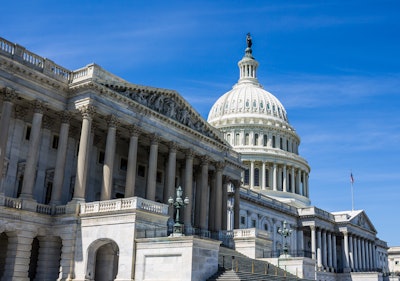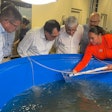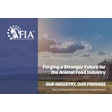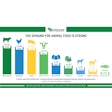
In an election marked by unprecedented turbulence and historic outcomes, Constance Cullman, president and CEO of the American Feed Industry Association (AFIA), offered an industry insider’s perspective of how the feed industry can navigate the challenges and opportunities posed by President Donald J. Trump’s return to the White House.
At AFIA’s 2024 Equipment Manufacturer's Committee (EMC) Conference, held at the Hyatt Regency Coconut Point in Bonita Springs, Florida, Cullman addressed the profound implications of the 2024 election, which saw Trump become the second president in U.S. history to serve non-consecutive terms.
Cullman’s remarks, delivered just days after the election, highlighted the complex intersection of trade, regulation, geopolitical tensions and legislative dynamics that will define the feed industry’s future, as well as the risks and opportunities for the industry with a Republican-controlled Congress and Trump’s America First agenda.
Challenging domestic and global environment
An unprecedented level of turbulence defined the 2024 election cycle, characterized by controversy, legal drama and polarized rhetoric, Cullman said.
“We had an indicted candidate on the ballot, then off the ballot in Colorado, then back on the ballot, and then convicted of a felony,” Cullman said. “This is the kind of drama you can’t make up in elections.”  Constance Cullman, president & CEO of American Feed Industry Association (AFIA)
Constance Cullman, president & CEO of American Feed Industry Association (AFIA)
However, the result of the presidential election was swift and will directly affect the feed industry and AFIA’s policy priorities. Trump’s victory and Republican control of the Senate and the House create a pathway for aggressive policy shifts, particularly in trade, energy and immigration.
Cullman noted that these policy changes would occur amid an already challenging environment for the industry. The ongoing war in Ukraine, persistent inflation and China’s growing influence in agriculture are among the leading global and domestic pressures that will be pivotal in shaping the industry’s future.
With a host of critical issues facing the feed industry, the war in Ukraine remains a significant concern. The prolonged nature of the conflict and its cascading effects on global markets could further disrupt global grain supplies, driving volatility in feed prices.
“We thought the Russia-Ukraine war would last six days,” Cullman said. “It’s been far longer, and we’re seeing real impacts on agriculture.”
Cullman predicted that Trump’s push to end the war might lead to territorial concessions, further destabilizing global grain markets.
She also highlighted inflation as another key challenge. In most U.S. counties, inflation has outpaced wage growth and fueled widespread dissatisfaction, as well as influenced policy.
Calling attention to China’s role in the global agricultural economy, Cullman warned of the risks associated with dependence on Chinese imports, particularly in critical input markets.
“Eighty-five percent of vitamins and 60% of amino acids come from China,” Cullman said. “What happens if that supply chain is interrupted?”
Cullman stressed the importance of diversification to mitigate these risks, citing China’s investments in agricultural infrastructure and commodities in South America and Africa as further evidence of its growing competitiveness.
Trade and energy policy
Cullman said Trump’s trade policies, such as proposed tariffs of up to 60% on Chinese imports, raise significant concerns for the feed industry. Her warning about the industry’s reliance on China painted a stark picture of the risks posed by strained trade relations and supply chain vulnerabilities.
Trump’s vow to renegotiate the United States-Mexico-Canada Agreement (USMCA) adds another layer of uncertainty. Proposed tariffs of 200% on Mexican automobiles represents a dramatic escalation in trade tensions, with potentially severe consequences for feed operators reliant on cross-border trade.
“For anyone who says, ‘That’s just campaign rhetoric,’ I would point you to Day 1 of his first administration," Cullman said. “Trump doesn’t just say things — he acts.”
Domestically, Trump’s energy policies present a mixed picture. While increased fossil fuel production could stabilize transportation costs, Cullman noted that a rollback of renewable energy initiatives might create long-term uncertainty for energy pricing and infrastructure development.
The administration’s likely focus on symbolic immigration actions, such as high-profile deportations, could also divert attention from pressing economic and industrial issues.
Congressional inefficiency
Cullman also described significant congressional dysfunction as a serious impediment to progress on critical issues.
“The 118th Congress passed just 78 bills, 12 of them naming buildings, making it the least productive in modern history,” she said.
Legislative stagnation could delay essential measures like the farm bill, jeopardizing infrastructure investments and regulatory reforms crucial for the feed industry. Cullman also highlighted the narrow majorities in Congress, which could exacerbate gridlock despite Republican control of both chambers.
Implications for the feed industry
Cullman’s analysis of the 2024 election’s implications for the feed industry ranged from trade and regulation to energy and geopolitics, addressing complex and urgent issues and underscoring the interconnectedness of political and economic forces.
“The economy, or our feelings about the economy, drove the vote,” Cullman said. “The same will drive the future of our industry.”
An already challenging environment and the implementation of Trump’s policies beginning in 2025 carry the risk of supply chain and trade disruptions and legislative delays, likely to define the immediate future for feed industry operators and executives.
The U.S. feed industry’s reliance on Chinese inputs, such as vitamins and amino acids, presents a significant vulnerability, while proposed tariffs and trade renegotiations could further complicate global markets. Energy policies and infrastructure investments will also play a crucial role in shaping the operational landscape for feed manufacturers, she said.
As Trump’s administration takes shape, feed industry leaders must navigate an uncertain and evolving landscape with resilience and strategic foresight. She stressed the need for proactive strategies to address these challenges, such as diversifying supply chains, closely monitoring geopolitical developments and advocating for industry priorities through organizations like the AFIA.
“The AFIA stands committed to working with the administration to address supply chain vulnerabilities, engaging with policymakers and adapting to shifting global dynamic,” Cullman said.
Amid her calls to action and recommendations for industry leaders, Cullman concluded with cautious optimism, noting the feed industry’s ability to thrive in uncertain times. While acknowledging the headwinds, she said strategic adaptation and proactive engagement will provide feed industry leaders a pathway for resilience.


















